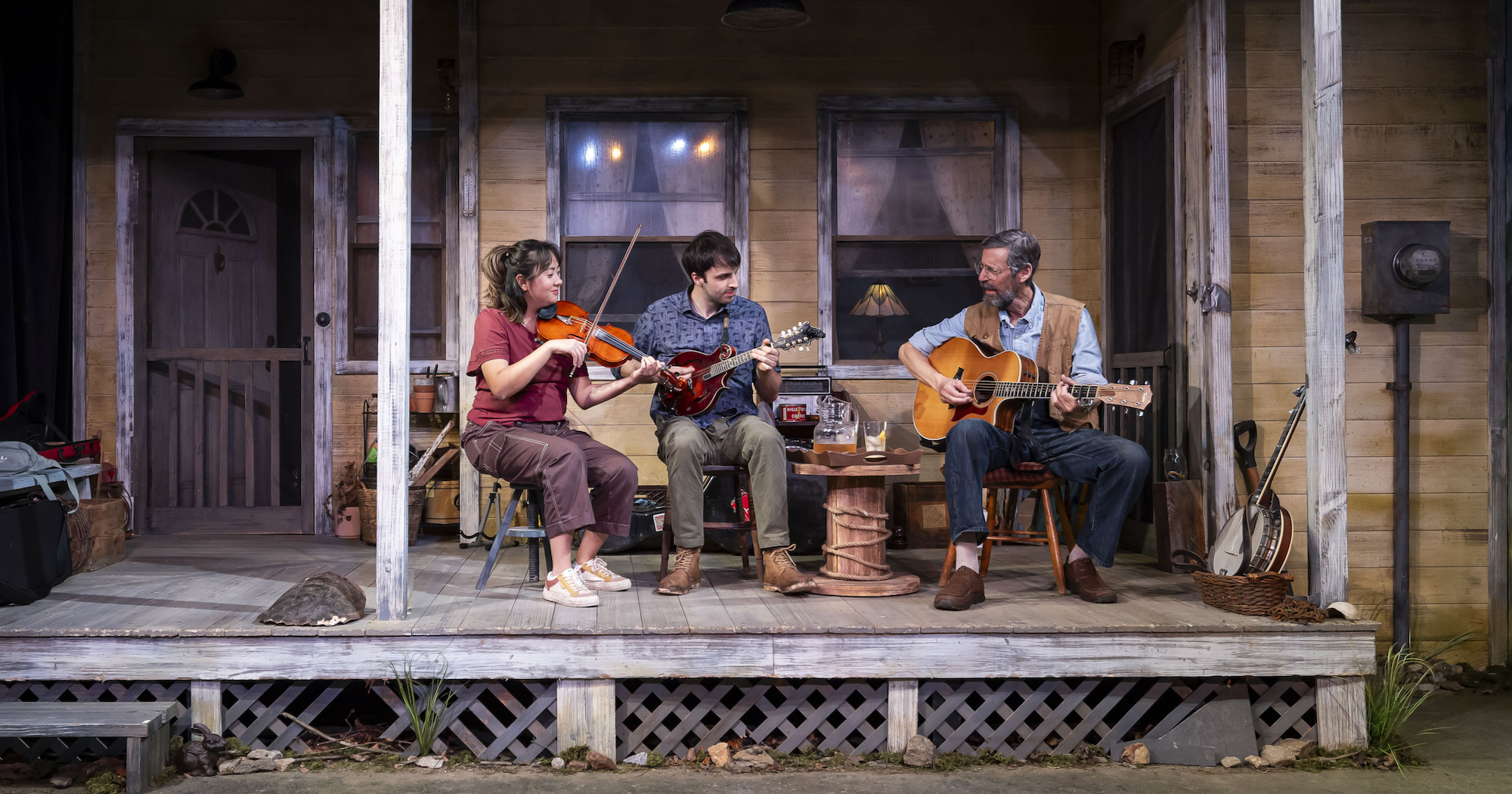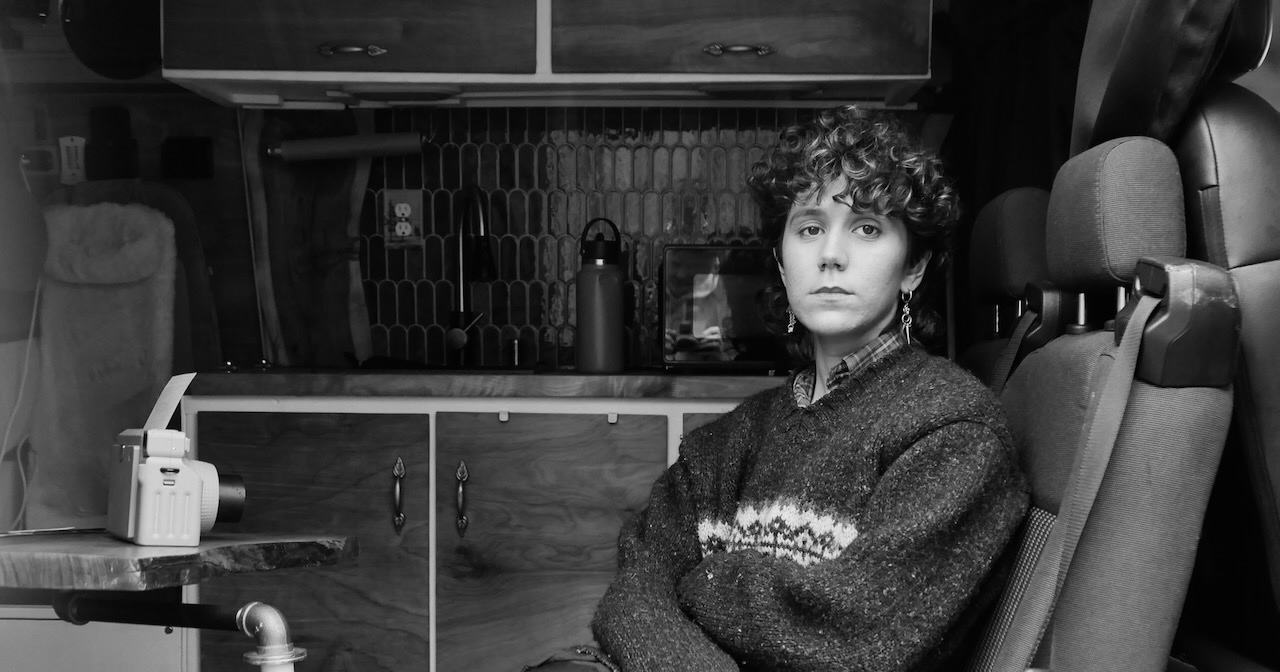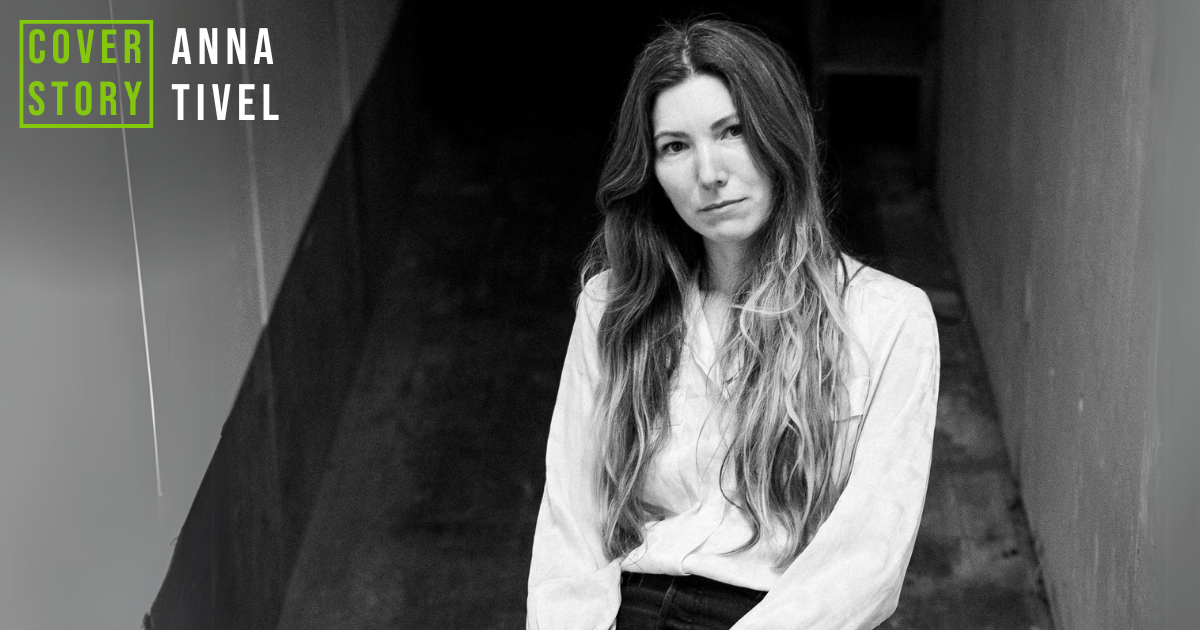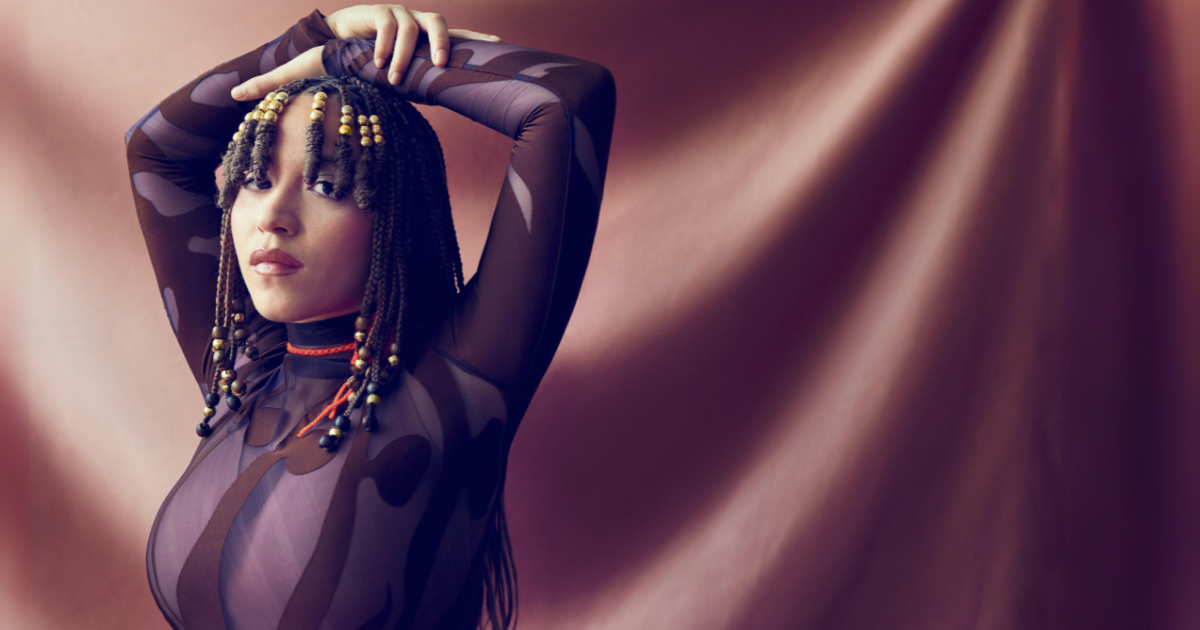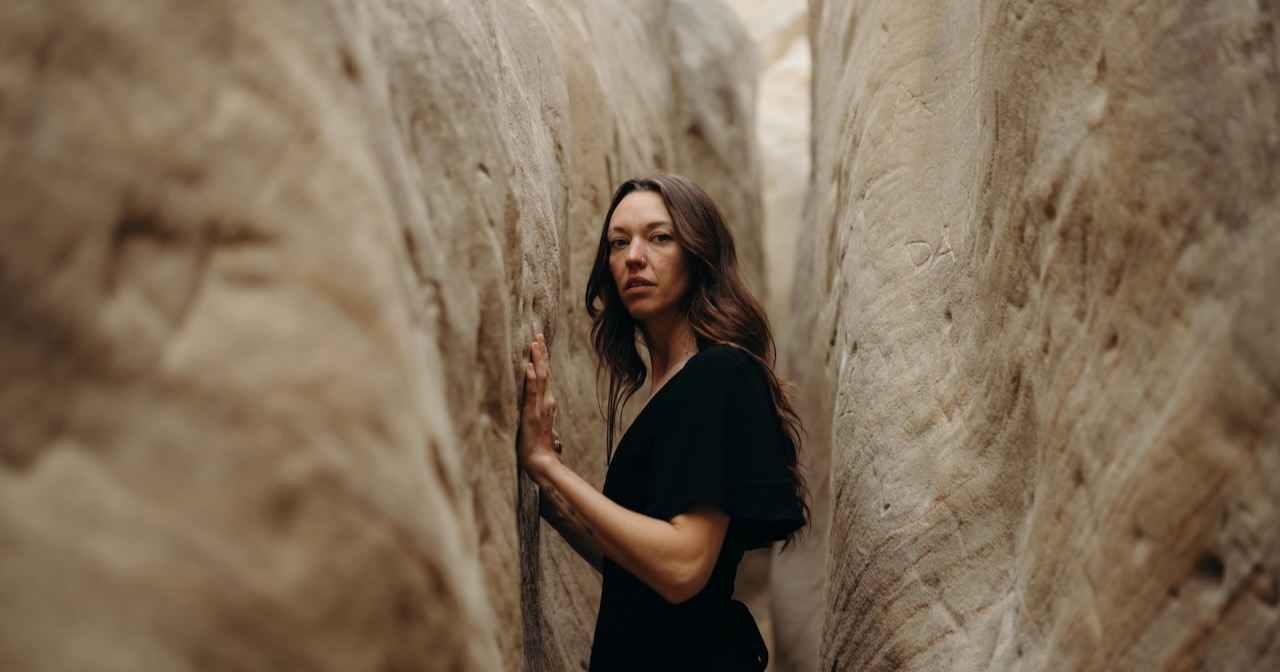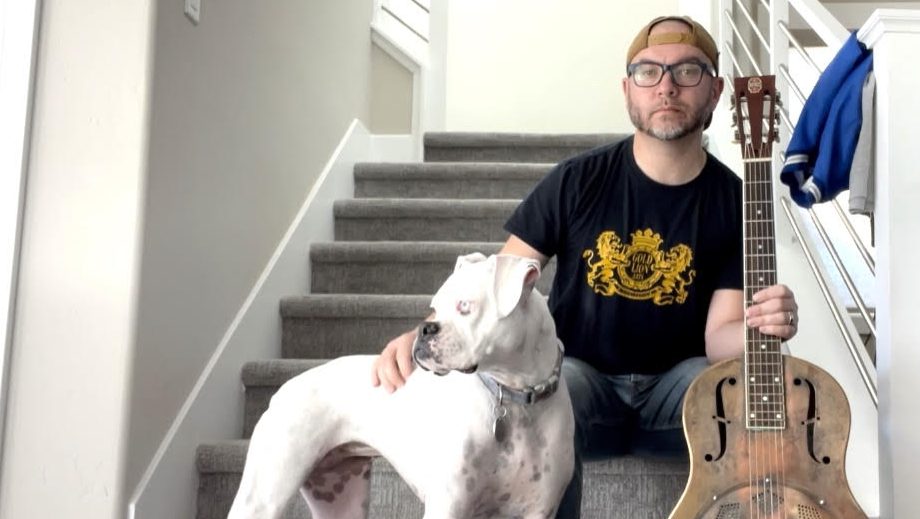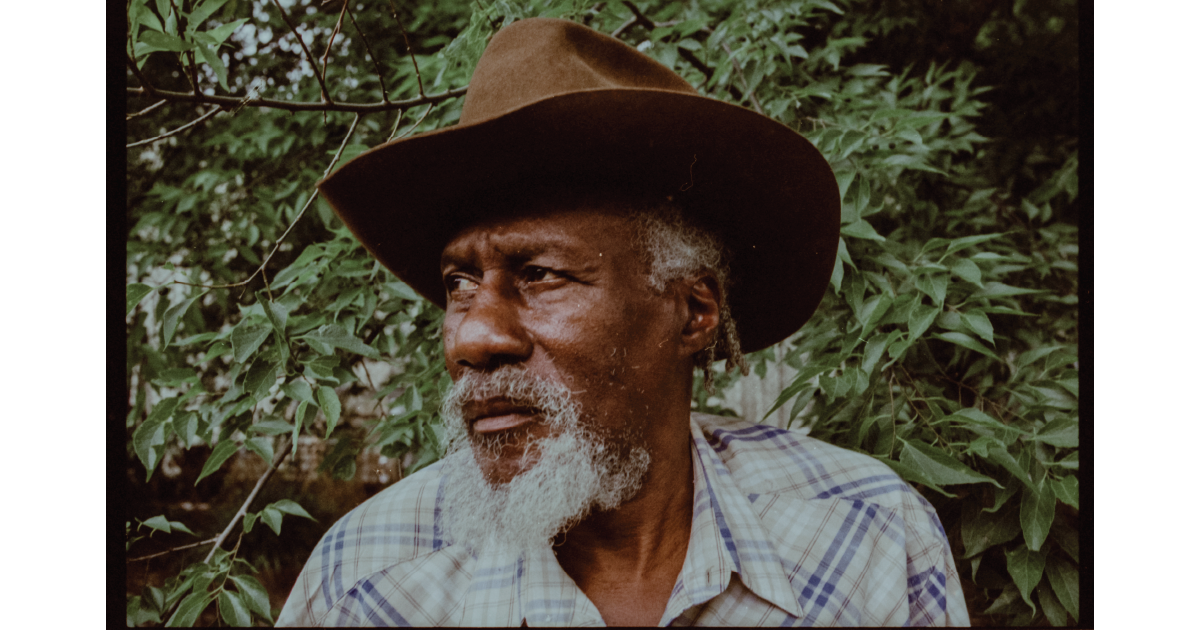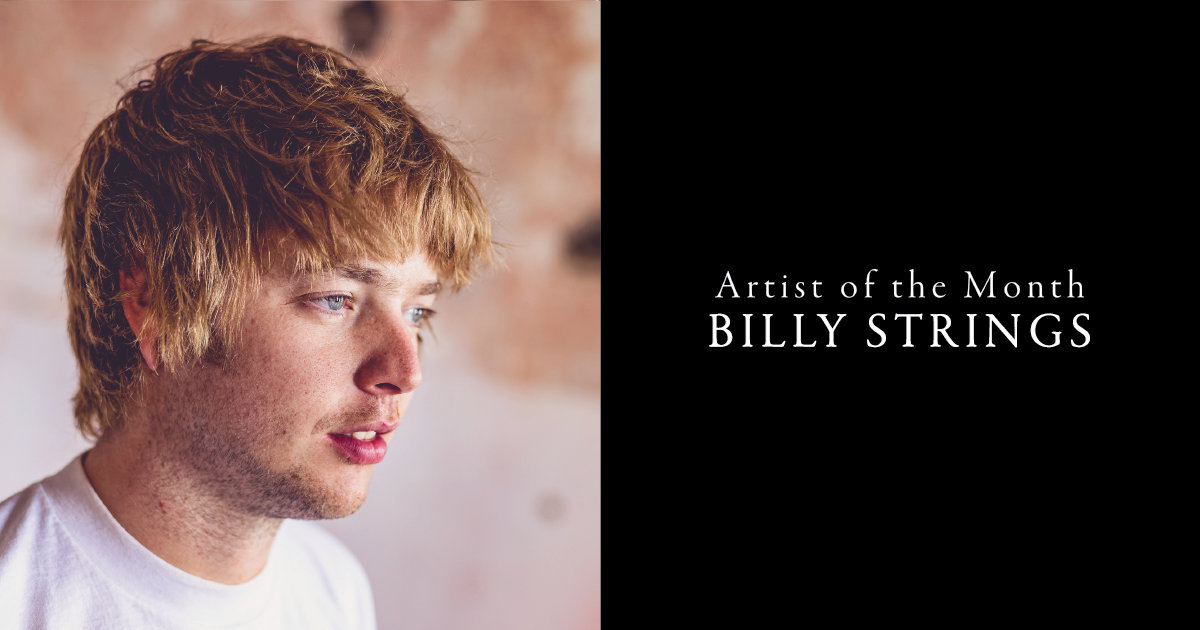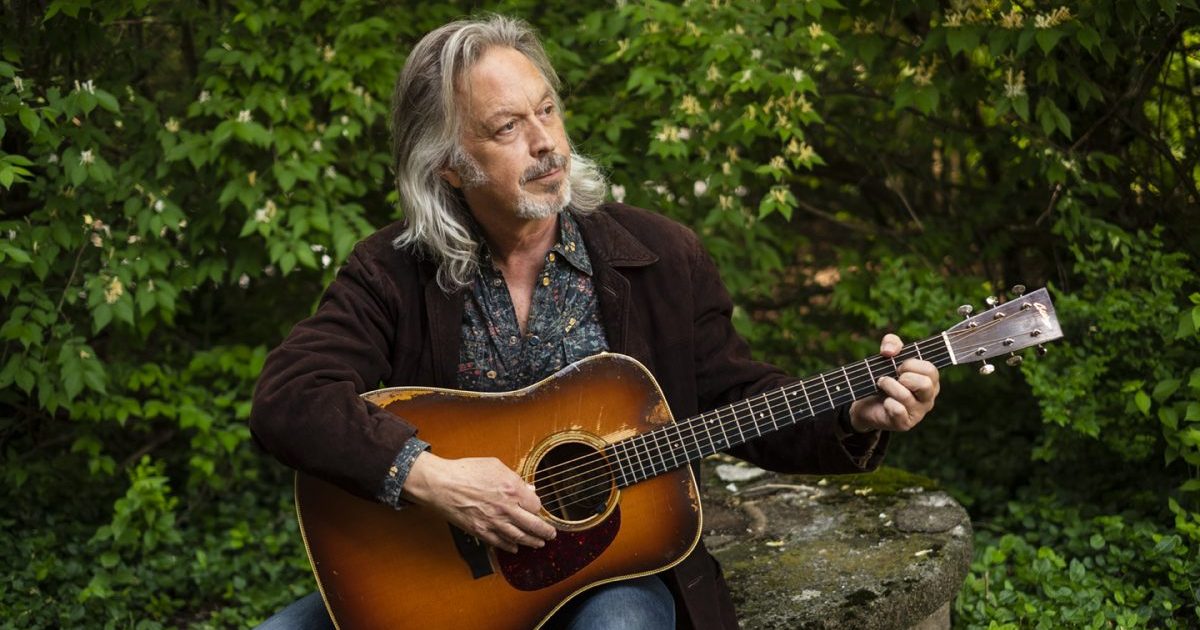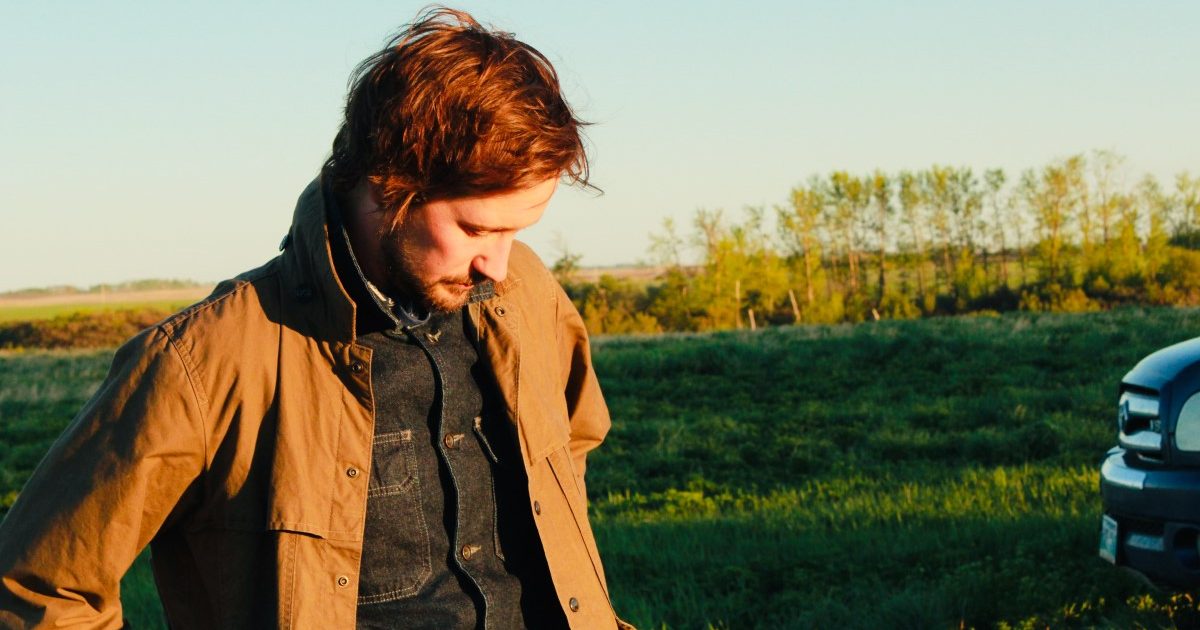A fantastic new off-Broadway play, titled The Porch on Windy Hill: A New Play with Old Music, has been performed across the U.S. in Vermont, Pennsylvania, and Illinois, before landing at Urban Stages on West 30th Street in New York City where it’s currently playing until October 12, 2025. Written by Sherry Stregack Lutken, Lisa Helmi Johanson, Morgan Morse, and David M. Lutken, and directed by Sherry Lutken, The Porch on Windy Hill was born during the pandemic, when Sherry Lutken found herself having extensive conversations with one of her closest childhood friends, one who happens to be biracial, about their personal perspective and experiences. Sherry Lutken’s formal idea coalesced around April 2021 and the first full performance took place that September in Ivoryton, Connecticut.
The show centers on Mira, a biracial Korean-American classical violinist, and her boyfriend Beckett, a Ph.D. student passionate about the history and connections of folk music in America, as the couple leave their isolated apartment in Brooklyn and head for the lively pickin’ parties and folk festivals in Atlanta, Georgia. When their navigations and a fussy van engine take them on a detour into the Blue Ridge Mountains of North Carolina, a pit stop leads to a run-in with Mira’s estranged white grandfather Edgar, and Mira and Beck both find more than they bargained for. The encounter goes on to change the three characters in incredibly profound ways.
The music serves as a beautiful and powerful reflection of the many emotions that run high throughout the play, as well as a story-rich catalyst that fills in the blanks of who these people are, what they know and don’t know about one another, and, of course, why Mira and her grandfather grew apart after being so close during her childhood.
The boldness of The Porch on Windy Hill comes from its many contrasts and complements. The story unfolds entirely on the front porch of Edgar’s North Carolina home, which sits in the shadow of an unseen Mount Mitchell. David Lutken, Morgan Morse, and Tora Nogami Alexander – who play Edgar, Beckett, and Mira respectively – move in, about, and out of the setting in very natural ways. A tension rises between Mira and Edgar for most of the first half and the confined space only heightens the impact of the actors’ moods on the audience. The discomfort, though, isn’t just social anxiety. The core narrative mysteries and tensions of Porch are tied to its real world relatability around the ways different folks view race, politics, and in this story especially, folk music.
The first half of the play is also music-heavy, with an abundance of different folk tunes showcasing Lutken, Morgan, and Alexander’s skills on a potpourri of instruments from banjo to guitar to violin to the Chinese erhu, to dulcimer – an instrument that’s key to the story and one special aspect of the cross-generational bond between Mira, her mother, and Edgar. Over the course of the show, Edgar’s home becomes part pickin’ stage and part time capsule for Mira and Edgar to rekindle their long-lost connection. This isn’t without its thorny moments, which peak at the revelation that Mira and Edgar’s estrangement comes from trauma she experienced as a child when her cousin cruelly called her a racial slur, only for her grandfather to turn a blind eye to the incident. The subsequent chasm that formed left Mira and Edgar unsure of how to even begin addressing their discomfort, before their musical connection – and a bit of moonshine – helped to clear the air and start to mend decades-old wounds.
The Porch on Windy Hill isn’t about safe spaces. It isn’t about breaking into folk song to comedically cut the tension, and it isn’t about being a modern PSA for Asian-Americans. But what it does do is give its audiences a reminder of what it means to share space with people who don’t hold a carbon copy of one’s own views. It also gives permission to express anger, hurt, and confusion over the unique pain that comes with discrimination and ignorance of others’ lived experiences.
These characters think, react, question, demand, and forgive in wholly believable fashion. The Porch on Windy Hill gets and keeps you invested. From the first time Mira, Beck, and Edgar play “Little Old Log Cabin in the Lane” together to the moment Mira walks off saying, “Kamsahamnida” – “thank you” in Korean – to Edgar, before he goes inside to finally call Mira’s parents. It’s everything a stellar musical is: thought provoking, entertaining, emotionally stirring, and something that imparts a feeling of growth. The depth of personal stories that hold The Porch together make this play ideal for partnering with the legacy-laden nature of folk music.
David Lutken, Sherry Lutken, Morgan Morse, and Tora Nogami Alexander jumped on a group call and spoke with BGS about the multi-layered nuance behind The Porch on Windy Hill and how all the aspects of the play, from the conflicts to the specificity of the music utilized – even the story behind one made up fiddle convention! – had meaning and purpose to enhance the impact of the characters and the story.
What drove the decision to set Porch on the Windy Hill in the mountains of North Carolina, as opposed to another part of Appalachia or even a completely different part of the U.S.?
David M. Lutken: [Porch on The Windy Hill] could be set in many different parts of the United States, but [choosing North Carolina] had to do with several things. The music that I have been most familiar with all my life kind of emanates from a little bit of bottleneck down in the southeastern United States. And also it had to do with the specific instrument – the dulcimer – being something that comes from the Appalachian region, even though its earlier ancestors come from different places as well.
But it had to do with that, with instrumentation, the draw of the entire Appalachian region of the United States, and the metaphor in the show of Mount Mitchell and the highest point in all of the Appalachian region of the United States and all of those things stated there. I have to say, the fact that North Carolina is a decidedly “purple” place these days also has to do with it, particularly Western North Carolina, where you have places like Asheville that are very, very liberal, surrounded by counties that are very conservative, which happens in many other parts of the United States. But all of those things together I would say, pointed me [toward choosing North Carolina as the play’s setting.]
Morgan Morse: I’ll add one last very silly reason that influenced our decision, which is just geography. We have this couple, which is traveling from the East Coast, and they’re on their way to Atlanta, [Georgia], and that’s their next goal. So in general, we were also looking to find a location that sat pretty nicely between those two places.
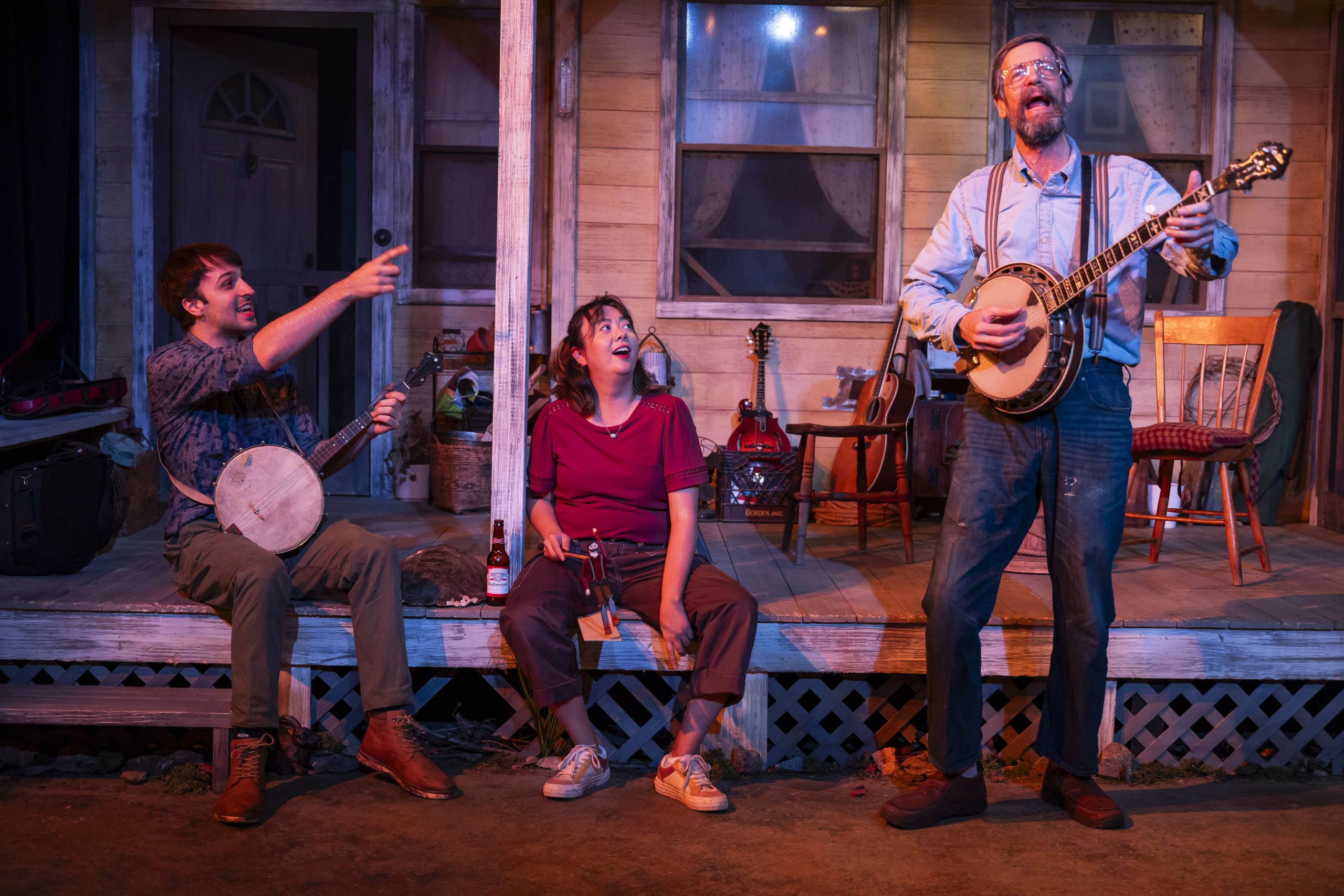
Tora Nogami Alexander: That is the most difficult part of the play and that is the thing that we focused on the most, with me being sort of the new addition to this version of this play. We practiced a lot of this music before we really dug into how the performance would translate. And so, as we were in the real meat of the rehearsals, [director] Sherry [Lutken] was really, really helpful in crafting the balance of the emotional baggage that Mira has and that everybody has within the play.
For me, what’s awesome about doing this play and what’s really fun for me, is that I do think I discover something new every time I do it. Every night, I really listen to my partners and we all listen to each other. It might change every day – how certain things hit us, how we process things. The bones are there but it’s been really interesting to try and tightrope that every night because it is a little bit different every single night, which is exciting and cool. Working with Sherry, she was so helpful in translating it because she’s watching the play and so she’s able to give us tools to help tell a story in a way that people can understand.
MM: Because there are so many emotions sitting under the surface in the first act, especially the first half of the first act, you want to strike a balance of making sure that it’s coming through without feeling like you’re overselling everything that’s happening underneath. So, throughout the results of that – Tora said “tightrope,” that was a word that we used a lot during rehearsals – especially for the character of Mira, she is figuring out what she wants from this situation and she’s figuring out how comfortable she is, how much she wants to engage. It’s something that Tora [does] so beautifully and it’s so fun to watch every night to see exactly how [the emotions] are hitting her and how she translates that to the way she plays [her violin].
DML: Well, the interesting part to me has been Tora’s ability to convey things musically. We set out to make a musical play where the music is a part of the dialogue and the ability to express vulnerability and frustration and a spectrum of emotions without opening your mouth, just playing violin, or even the erhu, or the other things that we all play. But particularly for Miss Alexander, I think that’s a unique talent of hers, and a unique thing to this show, particularly the first half of the first act. That’s a big part of what is happening with the music; it’s [songs] that certainly [Morse and Alexander] are familiar with, and they’re having to play them in a really weird situation.
You all mention in another interview that you wanted music that was “intrinsic rather than performative.” That the songs “aren’t decorative.” That said, the folk songs selected for Porch On The Windy Hill seem like they aren’t exclusive in their ability to convey or heighten the specific emotions desired in a scene. As such, what is it about the songs in the play that make each of them essential in a way other folk songs are not?
MM: On one hand, I can tell you all the reasons why these particular songs ended up there. And I do think that they work very well and they serve very specific purposes. At the same time, you’re kind of right that there are a billion other folk songs that could also fit into those slots. To me, that’s actually the amazing thing: American folk songs cover so many themes and some of them are universal themes and that’s what was so cool about putting these songs into the show.
There’s consideration like, “We need a fast song here.” “We need a slow song here.” “We need a song with this particular mood.” “Okay, we want to break up the flow of things by having an instrumental, what instrumental can we have?” So there’s those kinds of nuts and bolts and there’s the little ways in which, even though these songs were not written for the show, they still managed to reference and inform the action within their lyrics as well, because we’re singing about these universal things like love and loss and family and travel and childhood.
The question is, “What’s going to move these characters in this moment?” Whether that’s moving them emotionally or moving them forward story-wise. And sometimes it’s something like the history or the context of this song that can lead to a really interesting conversation. There’s a couple moments like that in the show, where the history of the song [being played] then becomes a catalyst for conversation between the characters and that leads to explorations of the themes of the show in that discussion because they’re all intertwined: the music, the country, and all those various things.
At a certain point, Beck abruptly recalls from where he recognized Edgar’s name. It was on a specific live recording of the 1972 Charlestown Fiddlers’ Convention, where Edgar is credited as performing with the likes of Roscoe Holcomb, Ola Belle Reed, Lily May Ledford. What was the inspiration behind this fictional recording and why select Holcomb, Reed, and Ledford as the artists meant to be Edgar’s connection to the real world?
DLM: I had met Bascom Lamar Lunsford on a couple of occasions when I was a boy and went to the Asheville Folk Festival regularly in the late 1960s. The others, Roscoe Holcomb and Ola Belle Reed, I will confess they had partly to do with Edgar’s politics. I was trying to keep Edgar a bit ambiguous in his set-in-his-ways old guy [personality] and make him a little bit more open-minded.
The particular selections we chose for the fictional Charlestown Fiddler’s Convention of 1972 were to try to make something that sounded real and give it a little bit of a historical novel perspective, and also to raise Edgar’s banjo playing – elevate it greater than mine could ever be – and to make it so that he would have been in on something like that if it indeed had existed. And with West Virginia being a little bit different from Virginia in its history, and also the history of music there, we just tried to pile on the old-time music references without skewing too much in one direction or the other. In terms of picking for the Bill Monroe Bean Blossom Festival or the Newport Folk Festival, if you know what I mean. So it was really just to put all of that together in a little bit of a historical novel sense and also to paint things with a little bit of an open minded brush.
Over the course of scene five to scene seven, the show moves from the American folk song, “Mole in the Ground,” to the Korean children’s mountain rabbit folk song, “Santokki (산토끼),” and finally the murder ballad “Pretty Polly,” which brings the unique sound of the Chinese erhu from the former into the latter and prompts a conversation about musical traditionalism – which instruments “fit” in a pickin’ party and which don’t.
What are your thoughts on Edgar’s view on the sounds that belong at a pickin’ party or jam? Furthermore, what do each of you think of as the central quality that makes something “folk” music and, in what way do you think people who may share Edgar’s view might be persuaded to consider a wider scope of sonic acceptance?
DLM: Well, I wish you had been at our last post-show hootenanny. Morgan, Tora, Hubby Jenkins of the Carolina Chocolate Drops, and a couple other folks were there and we all did a version of [Chappell Roan’s] “Pink Pony Club.”
It’s instrumentation, it’s sonic qualities of what’s going on, and it’s also the people who are doing it that are all part of how music becomes what it is. I personally am all for the erhu and the tuba and the bagpipes at a hootenanny all playing “Pink Pony Club,” because, it’s as Louis Armstrong said, “All music is folk music. I don’t see no horses listening to it.”
MM: I’m very much in the same boat. And it’s a very, for lack of a better term, fiddly question because it’s another one of these moments where it’s like, “Okay, [Edgar’s] got an open-minded streak about him but he still has limitations, you know?” Like, “Don’t bring an electric guitar, don’t play stuff out of your computer.” So there’s that technological line, which I think you could make an interesting argument for in this day and age, that this technological line maybe shouldn’t exist as much as it does.
You can make the argument that the kind of musicians who could really be considered to be making folk music at this point, and who definitely share a lot in common with the evolution of American folk music, are those who write hip-hop and rap. It’s the same kind of communal development where all of these different people are getting together for essentially, jams, where they’re taking things that they know and they’re remixing them, they’re learning from each other, and advancing with each other. So, you know, I’d be curious to have somebody come in with a little turntable to a hootenanny one time – that could be fun!
TNA: Folk music has to do with people and folk music exists everywhere, not just here. So yes, you know, mixing it up doesn’t seem too crazy to me, since organically it’s what would happen as our world gets more globalized.
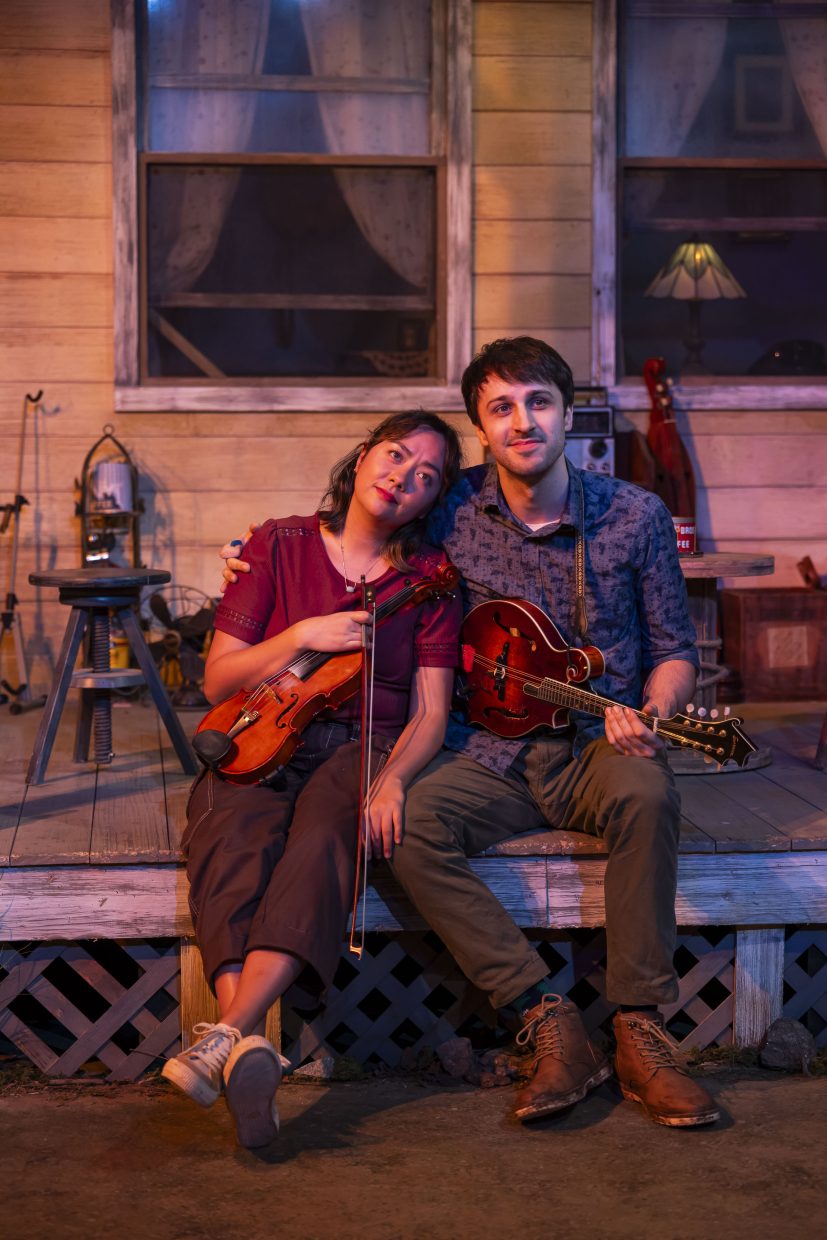
TNA: In that moment, I think a lot about Elmira, [Mira’s grandmother]. I think a lot about her grandmother and the relationship of her grandmother and Mira’s mother. And I think about that relationship a lot during that song. For me, I think that moment is basically when all the shit blows up, it sucks, and Mira’s in this place where she’s finally alone and working through what happened. But [she’s] also realizing, through this song – one that was her mom’s favorite song and that maybe Mira learned from her grandma – that [it] wonderfully encapsulates the whole story. That [Mira’s] mom needed to get out of North Carolina and she chose the life she did for whatever reason. For me, that moment is sort of thinking about the mom-and-grandma relationship, how they got there. That also is why it leads to Mira calling her mom. She’s thinking through this song and then realizing that she needs to tell someone about it, someone who understands, and that would be her mom.
Sherry Lutken: I think for me, sort of what we talked about is that the dulcimer is the embodiment, in some ways, of Elmira – this sort of ghostly figure that hangs over the play and is there and ever present. They keep talking about her, they keep going back to her. That moment is very much about the matriarchy.
Mira’s surrounded by men the entire show and so the dulcimer and that line of women – of her mother, her grandmother, and the women before who are the reason for Mira’s birth – they mean that emotionally. That’s what I think Tora captures so beautifully and what that moment really embodies, that need to reach out to her mother even though she doesn’t really know what to say, even though she’s in a moment of flux, and even though she knows it’s going to be an upsetting thing. Still, she wants to talk. She’s not gonna let her mother evade the subject anymore. And she’s not gonna let Edgar avoid talking about it anymore – it’s time. That’s a wonderful moment of decisiveness. We get to see Mira’s decisiveness and this is a moment of the emotion really informing what she does next and the choices that she makes in the moment.
Given that the polarization of the U.S. has only become more aggravated since Porch On The Windy Hill was first performed in 2021, how much and in what ways would you say the impact of the story’s vision for self-reflection, forgiveness, and understanding has been affected?
DLM: When we were talking on opening night, Lisa’s [Helmi Johanson] husband was there with us at the party and he said it was ironic that what was written in 2021 has now become a period piece in several ways, because things have changed.
SL: Our relationship to the pandemic and to that time has changed. It’s amazing how quickly we forget that when we were in it, we thought we would never get out of it. We would never get to move forward because we were all stuck and it felt like forever. And now everything has changed. I think the thing for me is that, yes, the play rings differently now, but it’s still such a universal story. I think everyone can see themselves in each one of these characters in some small way, if they’re open to it. I think the play lends itself to self-reflection and also what we still want is the idea that there is hope and that there is a possibility of seeing each other’s humanity.
MM: I completely agree. I think it’s very easy right now to feel like there is no hope and that the wounds are just too deep. And whether it’s realistic or not, whether or not you think it’s idealistic or not, I think the thing that’s wonderful about the show is that it does open up a space where reconciliation is possible. Growth is possible. Forgiveness is possible. Owning up to your mistakes is possible, which is something that we’re missing a lot right now.
That and I think being really willing to admit that one is wrong and to take accountability for those things as well. I think stories like Porch on the Windy Hill do exist in the world and also I want more of them to exist in our world. So it’s a wish for how I think the world is in some ways and very much for how I wish the world could be.
The Porch on Windy Hill is showing off-Broadway at Urban Stages through October 12, 2025. Tickets and more information are available here. The official cast recording is available now via Bandcamp.
All photos courtesy of The Porch on Windy Hill and shot by Ben Hider.
